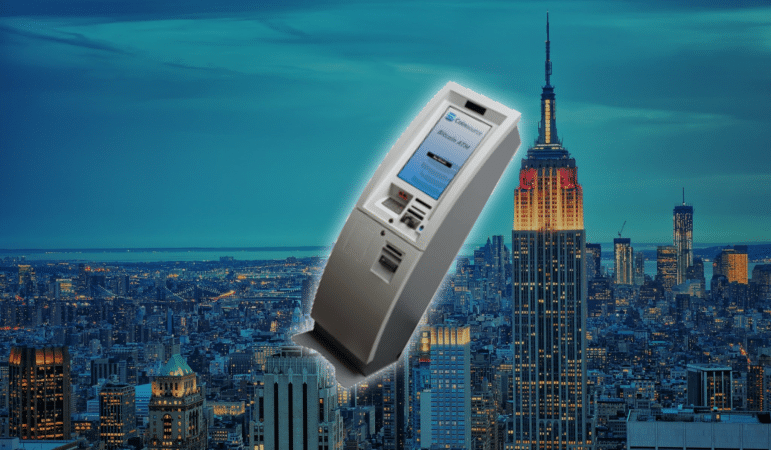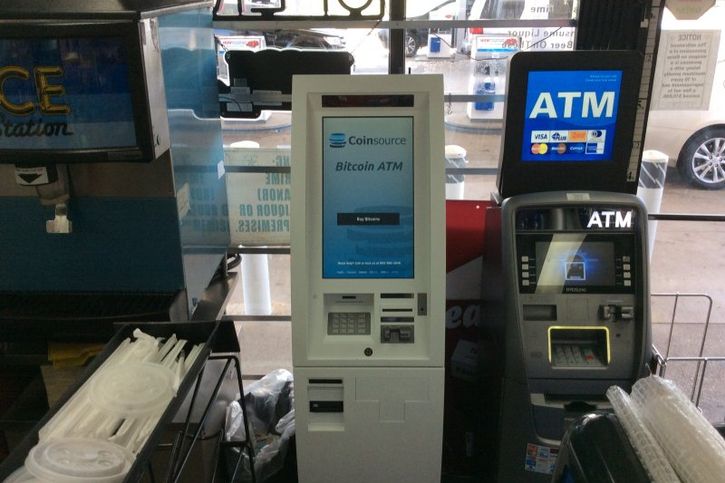In November 2017, the world’s largest Bitcoin ATM network was granted the much-desired Virtual Currency License by the New York Department of Financial Services, becoming the 9th company to do so.
Coinsource has been gunning for this license since the summer of 2015 and was primarily operating under a provisional license. The newly issued “BitLicense” grants the holder permission to conduct virtual currency activities within the state of issuance. Coinsource joins a list of some fairly influential companies such as BitFlyer, BitPay, Coinbase, Circle, and Square to hold this license.
With over 200 machines in 19 states, Coinsource has played a significant role in providing mainstream users access to cryptocurrency in convenient locations like gas stations. These machines allow customers to insert fiat and buy bitcoin to be stored in their mobile wallet, as well as selling bitcoin for fiat by scanning their mobile wallet.
On one hand, Coinsource has helped popularize and simplify cryptocurrency for thousands of people. Seeing a Bitcoin ATM (occasionally called a BTM) next to a freezer full of Redbulls and shelf with Slim Jims lends a sense of calming familiarity for a relatively overly high-tech concept for the average person.
On the other hand, Bitcoin ATM providers have received their fair share of criticism for charging exceptionally higher fees and premiums for their services. ATMs hover around a 6% to 10% premium on the price of a Bitcoin, whereas Coinbase, a digital exchange also scorched for its extremely high fees, charges 3.99%.
With the rapid growth of Bitcoin ATMs across the country, Coinsource is positioned to become a dominant force in onboarding an equally accelerated growing population of people taking steps to buy their first bitcoins. According to CoinATMrader.com, the number of Bitcoin ATMs has been growing around 4% every period. Of the 3931 machines in October 2018, Coinsource holds a share of roughly 5.1%, which seems to be enough to hold the marketed of “largest Bitcoin ATM network”.
CoinCentral connected with Coinsource CEO Sheffield Clark and General Counsel Arnold Spencer. Enjoy!
Coinsource has just been awarded the coveted “Bitlicense” by the New York State Department for Financial Services (NYDFS). Can you tell us a bit more about what the Bitlicense is, and what this achievement means for Coinsource?
Sheffield Clark: The “Bitlicense”, more recently known as the “Virtual Currency License”, is a business license for virtual currency activities issued by the New York State Department of Financial Services (NYSDFS) under specific regulations designed for companies operating within the state. The granting of this license is huge victory for Coinsource, as well as also a stamp of approval that allows would-be partners and users to confidently engage with our products and services. Over the next 180 days, we plan on tripling our presence in the state of New York.
Arnold Spencer: Receiving the Bitlicense means that Coinsource faces much less regulatory risk. We now have a structure under which we know we can operate in New York. During the application process, we faced the possibility that New York would set out certain requirements that we could not meet or that we would have to limit our business model in ways that could cripple our company. Now we have standards for compliance and a constructive and open dialogue with our regulators.
Additionally, interactions with other businesses – both crypto businesses and traditional businesses — are easier with the Bitlicense. Banks, and importantly, bank regulators view the Bitlicense as an additional level of comfort with the safety and soundness of our business. Hardware manufacturers and software programmers know that we are regulated by NYDFS, and they respect that.
The Bitlicense also provides us with credibility as we interact with other regulators. As we expand into new jurisdictions, we have the momentum of the New York license as well as all the policies and procedures that we created during the Bitlicense application process. We expect that we will be more favorably received in these new markets because of our success in New York.
Obtaining the Bitlicense required Coinsource to undergo rigorous compliance-based checks by the NYDFS. Can you explain how Coinsource Bitcoin ATMs ensure that the machines are not abused, hacked or used for any illicit activities? What sort of checks and controls does Coinsource perform on users of the ATMs to ensure compliance?
Sheffield Clark: As Coinsource is a nationally licensed and federally regulated company, and we take KYC/AML compliance very seriously. All Coinsource ATMs require proper ID verifications, phone numbers, and more. We do not share or sell any information to 3rd parties whatsoever.
With so many online exchanges now available, can you tell us some more about the long-term goals of Coinsource as a company focused on physical ATMs? How does your business model aim to compete sustainably with e.g. Binance, Coinbase or Bittrex, particularly given that users must register online in advance of using a Coinsource ATM?
Sheffield Clark: Bitcoin ATMs will continue to have a similar appeal for the same reason that regular ATMs do: they’re more direct and accessible. Most people with a casual interest in cryptocurrencies don’t want to jump through the hoops of connecting a bank account, waiting for a money order to transfer, monitoring price charts, making buy and sell orders, etc. We’re offering the simplest access to bitcoin at a competitive rate.
Do you have any usage stats to share with us that may be interesting for our readers? For example, how many users of Coinsource ATM’s, average transaction value, most popular location?
Sheffield Clark: I would say the most interesting data point is that we are the world’s largest bitcoin ATM operator in the world. Unlike all of our competitors, who have to use third-party software integration on existing machines, we offer a full stack service with proprietary software, hardware, and customer support.
One of the blog posts on your website talks about how cryptocurrencies are a solution for the unbanked. How does Coinsource play into this solution? What services can the company offer to the unbanked of the United States?
Sheffield Clark: Simply put, for those unbanked in the U.S., and eventually abroad, a bitcoin ATM that takes physical cash is the most direct way to gain access to the new global financial system. Bitcoin ATM networks provide a resource for stores of value that does not discriminate based on socio-economic history.
Can you tell us about future plans for rollouts in other countries beyond the US? Which countries will Coinsource target next, and why?
Sheffield Clark: We understand that the appeal of cryptocurrency ATMs is universal, and are therefore certainly open to the idea of expanding our reach in the future. However, for now our primary goal is ensuring that Americans in all 50 states have easy access to bitcoin.
Who is your target market? Is there a large unbanked population in the US?
Sheffield Clark: While a sizable minority of Americans remain either unbanked or underbanked, our product is intended for consumers across all demographics who want a simple and accessible option when buying bitcoin.
What are some of the largest challenges projects such as Coinsource will have to overcome in the near future?
Arnold Spencer: International regulatory markets provide a challenge to all crypto companies. The challenges are complex because the regulations vary from country to country, and each country has a changing, evolving regulatory landscape. Certain jurisdictions are trying to attract crypto companies by maintaining low regulatory hurdles. But cryptocurrency is a worldwide market and a borderless product. From our perspective, companies will need to comply with the most restrictive regulations in order to successfully operate worldwide. Simply complying with the regulations for Malta or for the State of Georgia will not enable companies to enter major markets like New York, Tokyo, and London.
The Coinsource transaction fee is substantially more than other exchange platforms. What value does a Bitcoin ATM bring to justify that large of a fee?
Sheffield Clark: Bitcoin ATMs differ from exchanges in a multitude of ways. With exchanges, there is no ability to execute an immediate sale of coins, and on most exchanges, there is no immediate buy ability either. Exchanges as well as most of Coinsource’s Bitcoin ATM competitors, charge additional “processing fees” on top of the exchange fees. We do not.
Exchanges also require extensive banking and credit card/debit card information from their customers, whereas Coinsource only requires proof of identity in accordance to state and federal banking regulations. Finally, our fees are among some of the lowest in the Bitcoin ATM sphere, allowing the unbanked, the underbanked, and even a first-time bitcoin buyer to walk up to one of our kiosks, insert cash, and immediately purchase and own bitcoin.
What does the relationship with a business location look like? Do they maintain the machines? Receive a portion of the revenue?
Sheffield Clark: Coinsource owns and operates all aspects of their Bitcoin ATM products and services. From live, 7-day customer support, to armored car cash pickup/drop-off services, to machine install and maintenance, the store owners and employees who host Coinsource Bitcoin ATM’s don’t have to lift a finger, it’s a turnkey business model where they receive a check every month for hosting a 2ft x 2ft space and an electrical outlet. Both businesses benefit as well with a substantial increase in foot traffic and sales.
While it seems that every project offering services/products somewhere in the financial supply chain would need one, few teams have a formal General Counsel. Could you elaborate on the role of General Counsel at a blockchain project?
Arnold Spencer: I handle all legal and compliance issues for Coinsource, working closely with our CEO and our CCO. Those responsibilities include broad strategic planning issues, like developing and implementing our proprietary compliance program or considering strategic growth strategies based on legal issues in various jurisdictions. And the responsibilities also include more traditional legal issues, like employment contracts and HR issues.
Coinsource decided at its founding that we would create a culture of compliance, that the company would include working within the legal and regulatory frameworks as a tenet of its mission. That has been relatively unique among cryptocurrency and blockchain industry. Many of the entrepreneurs in this space are primarily focused on innovation and disruption, which can be valuable. But there are often gaps between these new business models and existing regulatory compliance schemes. As the General Counsel, I make sure our creativity complies with the law.
How would you counter the argument that Bitcoin, or better yet privacy coins such as Monero/Zcash, will facilitate illicit activity at a massive scale?
Arnold Spencer: Criminals have engaged in illegal conduct long before the emergence of fiat currencies, no less cryptocurrencies. Cryptocurrency advocates never claimed that this was a solution to criminal activity, but rather that cryptocurrencies had tremendous advantages over physical, fiat currencies. One of those advantages is that cryptocurrency transactions can be tracked on their blockchain.
We are already seeing law enforcement adopt sophisticated blockchain strategies to investigate and prosecute criminal activity that uses cryptocurrencies. So we see a trend toward broadscale adoption of Bitcoin among law-abiding companies and individuals. No doubt that criminals will try to use privacy coins for illicit activities, but that simply puts these coins at the same level as cash.
Thank you!
Never Miss Another Opportunity! Get hand selected news & info from our Crypto Experts so you can make educated, informed decisions that directly affect your crypto profits. Subscribe to CoinCentral free newsletter now.











